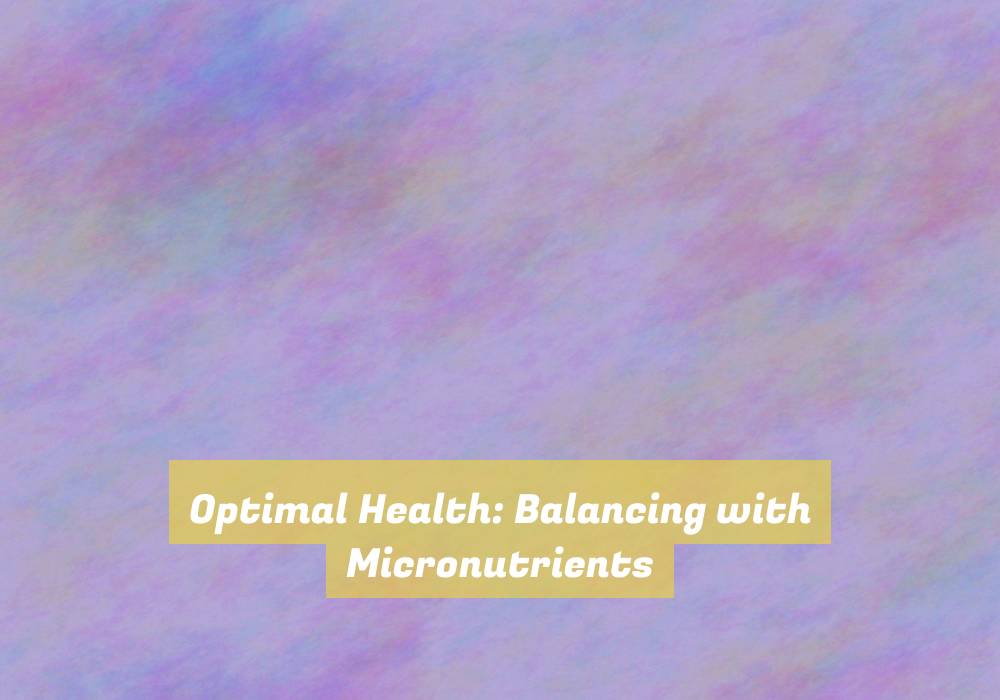Optimal Health: Balancing with Micronutrients
You may not be aware that micronutrients are essential for maintaining your overall health and well-being.
While you may be familiar with macronutrients like carbohydrates, proteins, and fats, micronutrients such as vitamins and minerals play a crucial role in supporting various bodily functions.
However, achieving optimal health is not just about getting enough of these micronutrients; itG??s about finding the right balance to ensure that your body functions at its best.
Understanding how to achieve this balance and the impact it can have on your health is key to unlocking your full potential.
The Role of Micronutrients in Health
Micronutrients play a crucial role in maintaining your overall health and well-being. These essential nutrients, including vitamins and minerals, are required in small quantities but are vital for various bodily functions. For instance, vitamin A is essential for maintaining healthy vision, while vitamin D is crucial for bone health and immune function. Minerals like iron and zinc are necessary for oxygen transport in the blood and immune system support, respectively. Without these micronutrients, your body may struggle to perform these essential functions, leading to various health issues.
Furthermore, micronutrients act as cofactors for enzymes, aiding in numerous chemical reactions within your body. For example, magnesium is a cofactor for over 300 enzymatic reactions, including energy production and DNA synthesis. Similarly, zinc is involved in the activity of over 300 enzymes, contributing to protein synthesis and cell division. Without these micronutrients, these vital processes would be impaired, impacting your overall health.
Therefore, ensuring adequate intake of micronutrients through a balanced diet is crucial for supporting your bodyG??s optimal functioning and maintaining good health.
Common Micronutrient Deficiencies
Common micronutrient deficiencies can have significant impacts on your overall health and well-being. Some of the most common deficiencies include iron, vitamin D, vitamin B12, calcium, and magnesium. Iron deficiency, for example, can lead to anemia, causing fatigue, weakness, and decreased immunity.
Vitamin D deficiency is associated with weakened bones and increased risk of fractures, while also affecting mood and immune function. Vitamin B12 deficiency can lead to anemia, neurological issues, and fatigue. Calcium and magnesium deficiencies can impact bone health, muscle function, and nerve signaling. These deficiencies can manifest as muscle cramps, weakened bones, and even heart irregularities.
ItG??s important to be mindful of your diet to ensure youG??re obtaining adequate amounts of these micronutrients. Consuming a variety of nutrient-dense foods such as leafy greens, nuts, seeds, dairy products, and lean meats can help prevent these deficiencies. In some cases, supplementation may be necessary, especially for individuals with specific dietary restrictions or medical conditions that affect nutrient absorption.
Regular check-ups with a healthcare professional can help identify and address any potential deficiencies before they lead to more serious health issues.
Strategies for Optimizing Micronutrient Intake
To optimize your intake of essential micronutrients, focus on incorporating a diverse range of nutrient-rich foods into your daily diet. Including a variety of fruits and vegetables in different colors can help ensure that youG??re obtaining a wide spectrum of vitamins and minerals. Dark, leafy greens such as spinach and kale are excellent sources of vitamins A, C, and K, as well as minerals like iron and calcium.
Adding nuts, seeds, and legumes to your meals can provide essential micronutrients such as magnesium, zinc, and selenium. Additionally, including lean sources of protein like fish, poultry, and tofu can contribute to meeting your micronutrient needs.
Furthermore, consider whole grains like brown rice, quinoa, and oats, which offer important micronutrients like B vitamins, iron, and fiber. Dairy products or fortified plant-based alternatives can be valuable sources of calcium and vitamin D.
Lastly, incorporating herbs and spices like turmeric, cinnamon, and ginger not only adds flavor to your dishes but also provides additional micronutrients and antioxidants.
The Impact of Micronutrients on Overall Well-being
Considering the impact of essential micronutrients on your overall well-being, a balanced intake of these vital nutrients can significantly influence your health. Micronutrients play a crucial role in supporting various bodily functions, including metabolism, immune response, and cognitive function.
For instance, adequate intake of vitamin C can boost your immune system, helping you fight off illnesses more effectively. Similarly, sufficient levels of vitamin D can contribute to bone health and reduce the risk of certain chronic diseases. Furthermore, essential minerals like iron and zinc are essential for energy production and wound healing.
Moreover, micronutrients such as omega-3 fatty acids are known for their anti-inflammatory properties, which can positively impact heart health and cognitive function. On the other hand, deficiencies in these micronutrients can lead to a range of health issues, such as fatigue, weakened immune function, and impaired cognitive abilities.
Therefore, ensuring a balanced and diverse intake of micronutrients through a varied diet or supplementation can contribute significantly to your overall well-being. By acknowledging the impact of micronutrients and making conscious choices to incorporate them into your diet, you can promote and maintain optimal health and vitality.
Conclusion
In conclusion, by paying attention to your micronutrient intake, you can improve your overall well-being and achieve optimal health.
Common deficiencies can be addressed through a variety of strategies, such as incorporating a diverse range of foods into your diet and considering supplementation when necessary.
Remember to prioritize micronutrients in your daily nutrition to support your bodyG??s functions and maintain a healthy balance.
Your health is worth the effort.





